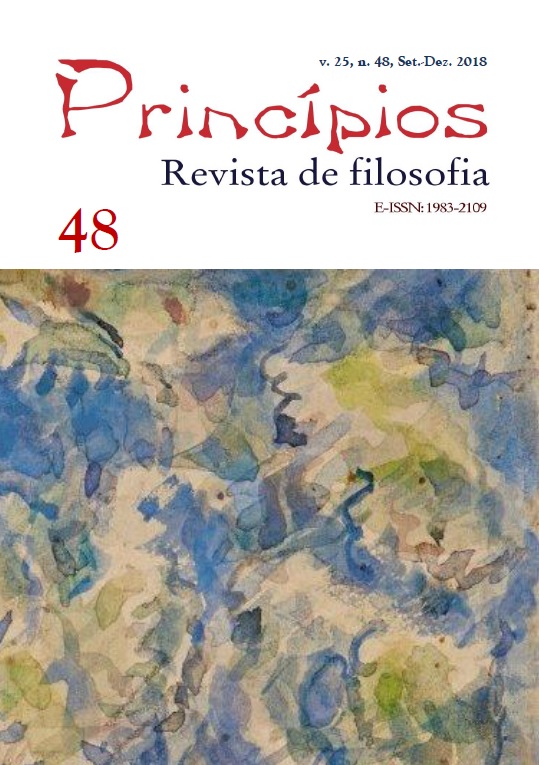Action and contingency in Hannah Arendt's The human condition
DOI:
https://doi.org/10.21680/1983-2109.2018v25n48ID14108Keywords:
Hannah Arendt, Politics, Contingency, Natality, UnpredictabilityAbstract
The purpose of this paper is to examine some aspects of Hannah Arendt’s theory of action in the light of the notion of contingency. Focusing our analysis on the concept of natality, but also paying attention to the concept of unpredictability, we intend to work out a path that allows us to apprehend certain distinctive features of her political thought.
Downloads
References
ABENSOUR, Miguel. La communauté politique des “tous uns”. Paris: Belles Lettres, 2014.
ALBANEL, Véronique. Amour au monde : Christianisme et politique chez Hannah Arendt. Paris: du Cerf, 2010.
ARENDT, Hannah. The origins of totalitarianism. Nova York: Harvest Book, 1951.
ARENDT, Hannah. The human condition. Chicago: University of Chicago, 1958.
ARENDT, Hannah. Truth and politics. In: ARENDT, Hannah. Between past and future. Nova York: Penguin, 1968. p. 227-264.
ARENDT, Hannah. The life of the mind. Nova York: Harcourt Brace Jovanovich, 1978.
ARENDT, Hannah. Walter Benjamin: 1892-1940. In: ARENDT, Hannah. Men in dark times. Nova York: Harcourt Brace, 1983. p. 153-206.
ARENDT, Hannah. Understanding and Politics. In: ARENDT, Hannah. Essays in understanding – 1930-1954. Nova York: Schocken Books, 2005a. p. 307-327.
ARENDT, Hannah. Journal de pensée – 1950-1973. Trad. S. Courtine-Dénamy. Paris: Seuil, 2005b.
ARENDT, Hannah. Karl Marx and the tradition of Western political thought. In: ARENDT, Hannah. Thinking without a banister: essays in understanding – 1953-1975. Nova York: Schocken, 2018. p. 3-42.
ARENDT, Hannah. Vida activa oder Von tätigen Leben. Munique: Piper, 2011.
AUGUSTINE. The city of God against the pagans. Trad. R. W. Dyson. Cambridge: Cambridge University, 2007.
BIRULÉS, Fina. Una herencia sin testamento: Hannah Arendt. Barcelona: Herder, 2007.
BIRULÉS, Fina. Contingencia, historia y narración en Hannah Arendt. Conferencia pronunciada em 2009. Disponível em: <http://congresos.um.es/ahha/ahha2009/paper/viewFile/6291/6031>. Acesso em: 3 abr. 2018.
CORREIA, Adriano. Natalidade e Amor Mundi: sobre a relação entre educação e política em Hannah Arendt. Educação e Pesquisa. São Paulo, v. 36, n.3, set.-dez. 2010, p. 811-822.
CORREIA, Adriano. Hannah Arendt e a modernidade: política, economia e a disputa por uma fronteira. Rio de Janeiro: Forense Universitária, 2014.
DUARTE, André. O pensamento à sombra da ruptura: política e filosofia em Hannah Arendt. São Paulo: Paz e Terra, 2000.
FORTI, Simona. Hannah Arendt tra filosofia e politica. Milão: Mondadori, 2006.
KAMPOWSKI, Stephan. Arendt, Augustine, and the new beginning. Grand Rapids: Eerdmans, 2008.
MATOS, Olgária C. F. O storyteller e o flâneur: Hannah Arendt e Walter Benjamin. In: BIGNOTTO, Newton; MORAES, Eduardo J. (Org.). Hannah Arendt: diálogos, reflexões e memórias. Belo Horizonte: UFMG, 2003. p. 90-96.
MOYN, Samuel. Hannah Arendt on the secular. New German Critique. n. 35, 2008, p. 71-96.
TSAO, Roy. Arendt’s Augustine. In: BENHABIB, Seyla. (Org.). Politics in dark times: encounter with Hannah Arendt. Cambridge: Cambridge University, 2010. p. 39-57.
VAZ, Celso. A hybris da filosofia da existência e a condição humana do indivíduo secular. In: CORREIA, Adriano. (Org.). Hannah Arendt e a condição humana. Salvador: Quarteto, 2006.
Downloads
Published
How to Cite
Issue
Section
License
Authors retain copyright and grant the journal right of first publication with the work simultaneously licensed under a Creative Commons Attribution License that allows others to share the work with an acknowledgement of the work's authorship and initial publication in this journal.


 Português (Brasil)
Português (Brasil) English
English Español (España)
Español (España) Français (Canada)
Français (Canada)


